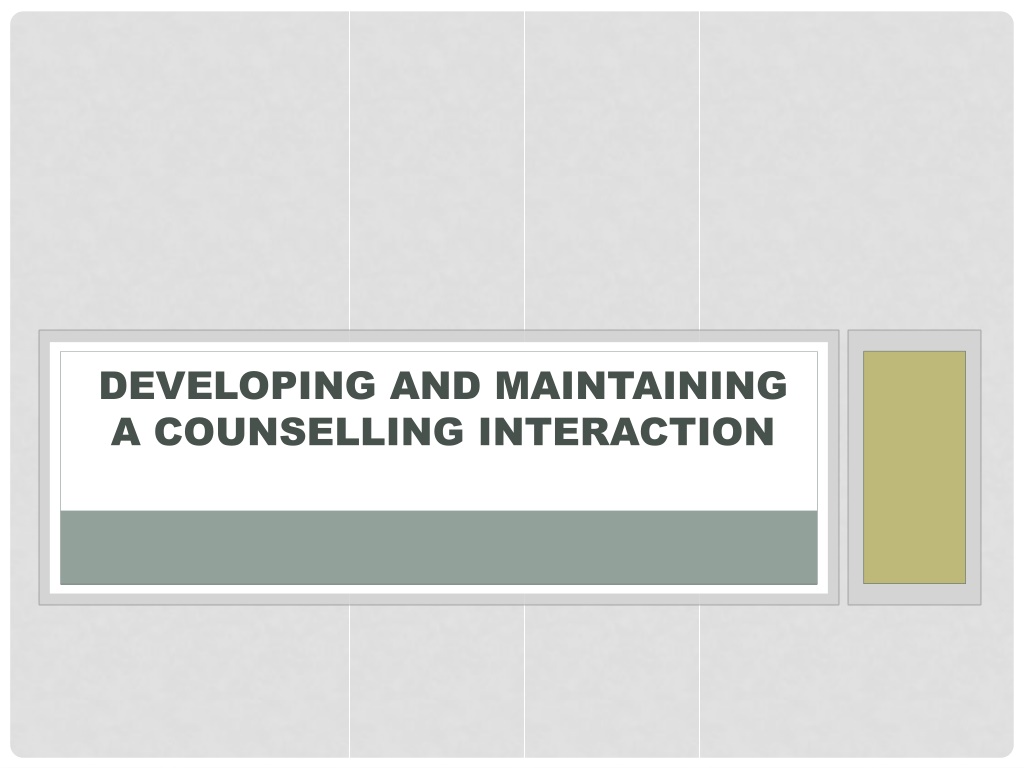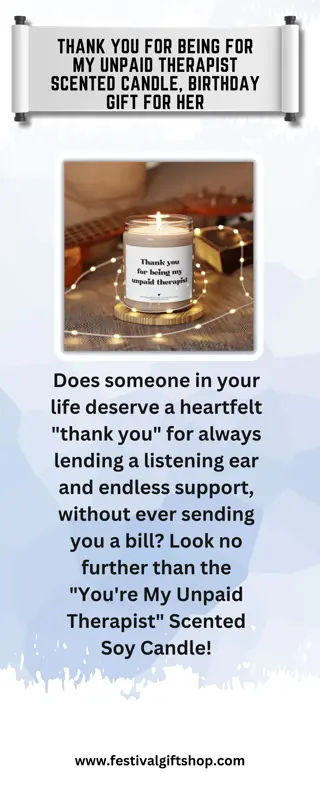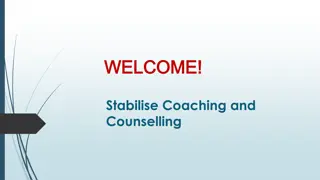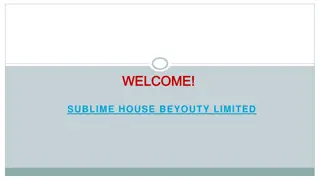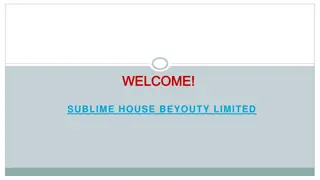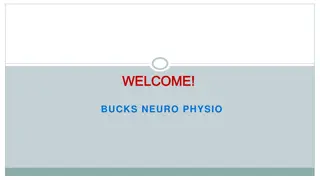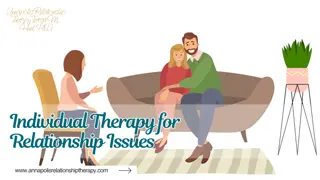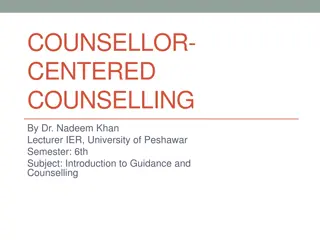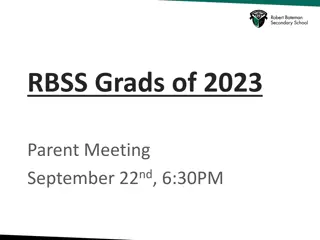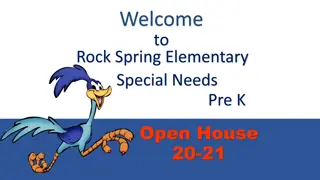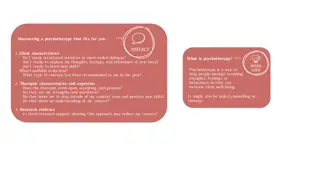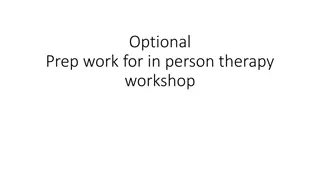Choosing the Right Counsellor or Therapist: A Comprehensive Guide
This comprehensive guide covers the important aspects of developing, maintaining, and finding a suitable counsellor or therapist. It delves into what to consider when seeking counselling, how to choose a qualified professional, where to find recommendations, and emphasizes the importance of relying on your instincts. The checklist provided outlines crucial items to consider in a counselling contract for a successful therapeutic experience.
Download Presentation

Please find below an Image/Link to download the presentation.
The content on the website is provided AS IS for your information and personal use only. It may not be sold, licensed, or shared on other websites without obtaining consent from the author. Download presentation by click this link. If you encounter any issues during the download, it is possible that the publisher has removed the file from their server.
E N D
Presentation Transcript
DEVELOPING AND MAINTAINING A COUNSELLING INTERACTION
CHOOSING A COUNSELLOR OR THERAPIST What do you hope to get out of counselling why are you seeking it? How could counselling successfully help you? In what ways could it fail you or make your situation worse? Do you want short- or long-term help? How much can you afford? What type of therapy would suit you?
FINDING A COUNSELLOR OR THERAPIST Personal recommendations by someone who knows you well and whose judgement you trust Consult directories provided by major national professional bodies such as the NCS, BACP, BPS, COSCA, UKCP. Contact organizations specializing in the type of issue for which you want counselling to see if they can provide counselling or put you in touch with a recommended local counsellor. Good starting points are MIND or RELATE
CHOOSING A COUNSELLOR OR THERAPIST What qualifications do they have, and what sort of training was required to get these? What experience have they in general and with the type of issues you want help with? What have been the outcomes for their clients? Are they registered on either a statutory or accredited voluntary register? Are they members of any professional organizations?
RELY ON YOUR INSTINCTS If you don t like the way a therapist communicates with you, feel uneasy about whose needs are going to be met, or mistrust the counsellor for any reason, do NOT go to them. You need to feel able to share private feelings and experiences freely with this person and to be confident that they will respect you as a person. Therapy is for your benefit as the client and not the other way round. If you have any concerns about the way your counsellor is working with you, discuss these with them at the earliest opportunity.
CHECKLIST FOR ITEMS TO CONSIDER IN A CONTRACT Name and address Contact details Fee structure and policy (e.g. charging for missed sessions or not, fees for phone calls, for writing reports, action for non-payment) Frequency and duration of sessions (regular, fixed, or upon request) Policy for non-attendance (will therapy be withdrawn ?) Holidays Cancellation of sessions Terminating therapy Contact between sessions Confidentiality issues legal limits, client consents Record keeping and how long will be kept? Client right to access records Use of records for supervision, research, audit etc. Relevant Data protection Tape and other recordings - (ownership, access, potential uses, and retention Counsellor s professional membership, code of ethics, insurance
INTRODUCTION Being an effective therapist is not just a matter of good interpersonal skills, sensitive self-awareness, and relevant personal life experience ..it also depends to a large extent on the operation of an array of support mechanisms and institutions: training, supervision, personal therapy, deliberate practice, appropriate career development opportunities, professional networks, and access to research knowledge ..
IMPORTANCE OF MORAL AND ETHICAL DIMENSIONS OF THERAPEUTIC WORK Ethical issues in therapy represent a crucial point of connection between personal aspects of being a therapist, in the form of awareness of personal values and the capacity to offer care and acceptance to people with different beliefs and backgrounds, and broader professional and societal aspects, such as adhering to codes of practice, being bound by legal statutes, and confronting injustice wherever it occurs.
QUIZ Q: Which is true? 1. The initial session is when contracting takes place? 2. It takes place at my leisure. 3. It is essential I explore the feelings of the client before considering the contract
QUIZ Q: Which is false? 1. Contracting helps to protect both the counsellor and the client. 2. The contract is a mutual agreement between both the counsellor and the client. 3. The main purpose of the contract is to demonstrate my professionalism.
QUIZ Q: Which is true? 1. The contract needs to be lengthy and descriptive 2. It is important to check the client s understanding of the contract. 3. As long as harm to self and others is covered, all else can be addressed as we go
QUIZ Q: Name three skills that help to build rapport
QUIZ Q: Name and describe three counselling skills that develop and maintain the helping relationship.
SKILLS TO BUILD AND MAINTAIN A COUNSELLING RELATIONSHIP Empathy Active listening and attending Paraphrasing Reflecting Open questions Summarising Focusing Concreteness Skills-learning is a process
CLOSED & OPEN QNS. Closed Questions Useful for seeking factual information/data Elicit a yes or no Keeping reins of communication with counsellor e.g. Have you had counselling before? Have you got any children? Do you drink?
OPEN QUESTIONS ARE DESIGNED TO HELP CLIENTS: Think, reflect, elaborate, be more specific, encourage exploration, gauge feelings, build rapport, establish understanding - discourage yes or no responses E.g. Tell me how was the ? What s uppermost in your mind at the moment? What inspired you to ? Earlier on you mentioned I wasn t quite clear what you meant perhaps you can give me a specific example? What would you like to see change?
TRY THIS. Exercise - Open questions - Joe Joe says, Honestly, I don t know what to do. It sounds really silly, I m twenty-eight but I m afraid of women. I like them, I think, but I never know what to do. Maybe its because I like them too much. I start to get to know a girl, and it s OK. Then I just fall head over heels for her. It scares me. I always end up getting hurt. That s how it s happened before, and that s how it is with Emma. (see next slide)
RESTRUCTURE THESE FIVE CLOSED RESTRUCTURE THESE FIVE CLOSED QUESTIONS INTO OPEN QUESTIONS: QUESTIONS INTO OPEN QUESTIONS: 1. How many times has this happened before? 2. Are you in love with Emma? 3. When was the last time this happened to you? 4. Is she in love with you? 5. Are you afraid of girls hurting you or you hurting them?
TIPS - AVOID QUESTIONING TRAPS SUCH AS . 1. Asking two or more questions at same time 2. Wrong timing interrupts/hinders the process 3. Too many questions 4. Limiting questions e.g. Don t you think that?
MORE QUESTIONING TRAPS TO AVOID 6. Punishing questions e.g. With your vast experience, you can answer that question, surely? 7. Hypothetical questions typically begin with If , What if ? 8. Demand or command questions e.g. Have you done anything about ? 9.Rhetorical questions, i.e. I ve got you or statements which sound like questions You argue with her a lot, don t you?
USEFUL TO REMEMBER Respond to what the person has said, (rather than asking questions). Think of the counselling process as building a wall, brick by brick; the client makes a statement (brick one), the counsellor makes one (brick two) Do not rush ahead or cause anxiety by pushing into areas not yet ready to be explored
REFLECTING To reflect, we need develop a wide vocabulary . List 3 alternative words for the statements below: I feel afraid You feel _ _ _ _ _ _ _ _ I feel antagonistic You feel _ _ _ _ _ _ _ _ I feel confused You feel _ _ _ _ _ _ _ _ I feel miserable You feel _ _ _ _ _ _ _ _
MORE VOCABULARY TO REFLECT I feel empty I feel lost I feel lonely I feel angry I feel bored I feel silly I feel shocked You feel _ _ _ _ _ _ _ _ _ _ _ You feel _ _ _ _ _ _ _ _ _ _ _ You feel _ _ _ _ _ _ _ _ _ _ _ You feel _ _ _ _ _ _ _ _ _ _ _ You feel _ _ _ _ _ _ _ _ _ _ _ You feel _ _ _ _ _ _ _ _ _ _ _ You feel _ _ _ _ _ _ _ _ _ _ _
REFLECTING FEELINGS IN ACTION Client: I d just had enough of Dave. You should have heard the way he yelled at Emma. She s only 10 months old. Did I do the right thing leaving? Should we try again? Key words: had enough, Emma, right thing, try again What emotions need to be reflected for this client to feel heard ?
REFLECTING FEELINGS IN ACTION (CONTINUED) Counsellor: What I hear is that you couldn t put up with Dave s behaviour any longer, but are possibly having some regrets about leaving him and are wondering whether to attempt reconciliation. At the same time, you are concerned for Emma s safety, and you would like me to tell you what to do to resolve this conflict
EXERCISE REFLECTING FEELINGS Case study 1 Mary Mary says, I will be a success. I can do it if I work hard. If it takes 18 hours a day chained to a VDU, I ll do it. If husband and family suffer, too bad. I hope they don t, but it ll be worth it in the end. Success is what matters to me. Exercise: Identify the key words, then create a response of about six lines.
MORE REFLECTING FEELINGS Case study 2 Sam Sam says, I can never find the time to do the things I enjoy. I m just getting ready to go out for a swim, or go jogging, when Bill reminds me there s some letters to write to customers, or Susan collars me into helping with some household chores. It s getting increasingly difficult to get the fun out of life that I expect to have. It s depressing. Exercise: Identify the key words, then create a response of about six lines. This concludes the reflecting feelings exercises.
CONCRETENESS Being concrete does NOT involve generalised indirect and vague statements Concreteness is essential for clients coming to terms with their concerns Look at these two phrases: You never know when people approve of what you re doing I never know when people approve of what I m doing What is the difference?
IMPORTANCE OF CONCRETENESS Identifying thoughts, feelings, behaviour and experiences in specific ways. I makes it real Owning, not merely reporting such feelings, opens the door to exploring them Counsellors collude if allow clients to talk as if feelings belong to other people, not to them
QUESTIONS TO AID CONCRETENESS Can you say more? Would you elaborate? What else is there? Could you expand on what you ve just said?
SPECIFICATION QUESTIONS e.g. You ve referred to your tendency to procrastinate can you be more specific? What in this situation is causing you most concern? Can you give me a specific example of what I ve said that upsets you?
FOCUSING ON FEELINGS QUESTIONS Elicit feelings generated by a problem area, e.g. How does that leave you feeling ? Can you describe exactly how you are feeling..? How do you feel about that ? Can you name the feeling? Could it be that you are feeling ? Your body language suggests that you might possibly be feeling I m wondering if that s close to the mark or if I am way off beam ?
EXAMPLES OF CONCRETENESS Robert , to the school counsellor (generalised & vague): People keep picking on me Robert (concrete and specific): My classmates pick on me because I wear glasses Trudy, student teacher, to her supervisor (generalised & vague): I know I m dreadfully inconsistent in my work Trudy (concrete and specific): I make all sorts of teaching plans, yet on the day, I don t stick to them so the students seem to run the class
EXERCISE - WHICH TYPE OF QUESTION IS IT ? 1.Counsellor to Margaret: You say you feel you may have brought the rape on yourself in some way. To help me understand, can you be more specific? 2.Counsellor to Paul: You say you ve applied for 6 different jobs and haven t had any replies. How has this left you feeling? 1.Counsellor to Hayley: Can you talk me through what thoughts are going through your mind just before you cut yourself?
ONE MORE 4. Counsellor to Judy: You ve told me that a large part of you wants to share your life with Peter. Can you say precisely what it is that appeals to you about living with him?
BEING CONCRETE EXERCISES Turn generalised, vague statements into concrete ones. The aim: 1. To help you when a client is making a generalised statement 2. To help you make statements, which are more concrete than generalised 3. To enable you, by being more concrete, help clients explore their situation more effectively
CASE STUDY 1 ADAM GENERALISED & VAGUE Adam says I m not very considerate to my wife Imagine you are Adam. What sort of things would you say that would tell the listener precisely just how you relate to your wife?
CASE STUDY 2 JUDY GENERALISED & VAGUE Judith says, I find these counselling training groups really difficult Imagine you are Judith. What sort of things would you say that would tell the listener precisely just what your difficulties are?
CASE STUDY 3 BILL GENERALISED & VAGUE Bill says, I feel uneasy about the relationship with my mother Imagine you are Bill. What sort of things would you say that would tell the listener precisely your feelings about your mother?
